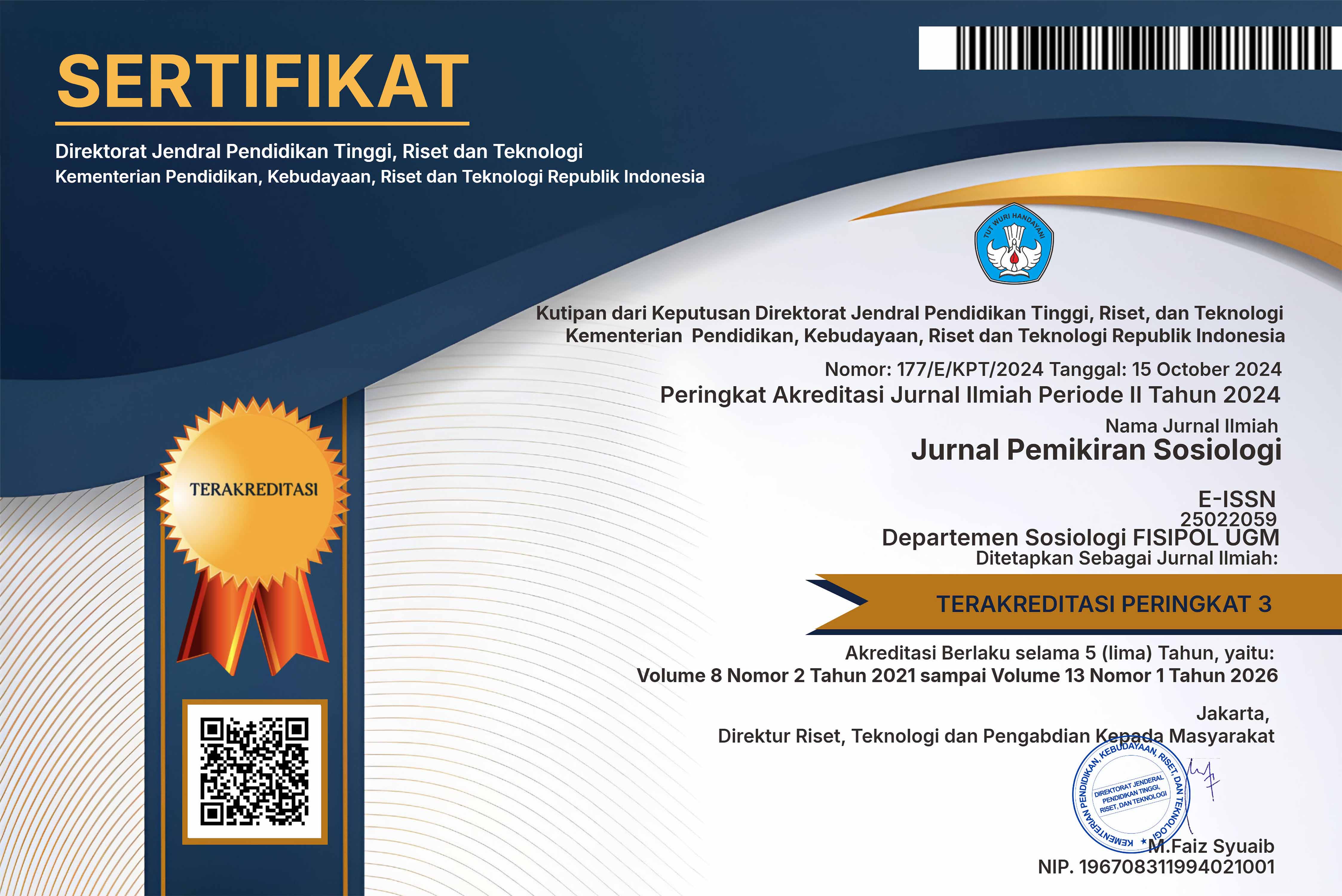Sustainable Development Goals (SDGs) Instrumentalization and Neoliberal Hegemony: A Village Perspective
Nefa Wahyuning Anggraini(1*)
(1) Department of Sociology, Universitas Gadjah Mada, Indonesia
(*) Corresponding Author
Abstract
The implementation of the Sustainable Development Goals (SDGs) for Villages in Indonesia since 2021 marks a significant change in the paradigm of village development. This policy is claimed to be an effort to accelerate sustainable development, but in practice, it constructs villages as objects of state control within the global development architecture. This research aims to examine how the Village SDGs operate within the power relations of the state, market, and village, and to evaluate their implications for the village's autonomy in determining its development direction. Using the Socio-Institutional Neoliberalism (SIN) approach by Toby Carroll, this research examines how village development policies are reproduced within the framework of global economic-political interests. This research uses qualitative methods with case studies in the Panggungharjo Village and Pandowoharjo Village, Yogyakarta. Data were collected through observation, in-depth interviews, and policy document analysis, and then analyzed using Yin's pattern matching technique. The research results indicate that the implementation of the Village SDGs is more oriented towards administration and compliance with global indicators rather than substantial village empowerment. The digitalization of village development not only complicates bureaucracy but also increases the village's dependence on central regulations, widens the technology access gap, and strengthens state and market control over the village. This research recommends a more democratic and participatory village development approach, allowing villages to implement development based on their local conditions. The reformulation of the Village SDGs policy must be oriented towards village independence, not merely administrative compliance with global targets.
Keywords
Full Text:
PDFReferences
Ariadi, Andi. 2019. “Perencanaan Pembangunan Desa.” Meraja Journal 21(1):135–47. doi: 10.51826/fokus.v21i1.737.
Badri, Muhammad. 2016. “Pembangunan Pedesaan Berbasis Teknologi (Studi Pada Gerakan Desa Membangun ).” Jurnal Risalah 27(2):62–73.
Belda-Miquel, Sergio, Alejandra Boni, and Carola Calabuig. 2019. “SDG Localisation and Decentralised Development Aid: Exploring Opposing Discourses and Practices in Valencia’s Aid Sector.” Journal of Human Development and Capabilities 20(4):386–402. doi: 10.1080/19452829.2019.1624512.
Bernstein, Henry. 2006. “Studying Development/Development Studies.” African Studies 65(1):45–62. doi: 10.1080/00020180600771733.
Bernstein. 2017. “Governing Through Goals: Sustainable Development Goals as Governance Innovation.” The MIT Press. doi: https://doi.org/10.7551/mitpress/10894.001.0001.
Carroll, Toby. 2007. “The Politics of The World Bank’s Socio-Institutional Neoliberalism.”
Carroll, Toby. 2010. Pembangunan Sosial Sebagai “Kuda Troya” Neoliberal : Bank Dunia Dan Program Pengembangan Kecamatan Di Indonesia. Prisma.
Cervantes, Juan. 2013. “Ideology, Neoliberalism and Sustainable Development.” Human Geographies 7(2):25–34. doi: 10.5719/hgeo.2013.72.25.
DJPK. 2019. Buku Pintar Dana Desa. Jakarta: Kemenkeu.
Fiantika, Feny Rita, Kusmayra Ambarwati, and Anita Maharani. 2022. Metodologi Penelitian Kualitatif. Padang: PT. GLOBAL EKSEKUTIF TEKNOLOGI.
Foucault, Michel. 1984. The Subject and Power. In The Essential Work of Foucault. New York: The New Press.
Indrawati, Reni Sara, Adek Media Roza Roza, Midori Reiginayosi, Evanny Silviana Intan Wibowo, and Adristi Naura Syifa. 2024. “Kesenjangan Digital Dan Akses Internet Di Kabupaten Katingan: Studi Kasus Pada Masyarakat Pedesaan.” Jurnal Kaganga: Jurnal Ilmiah Sosial Dan Humaniora 8(1):65–73. doi: 10.33369/jkaganga.8.1.65-73.
Iskandar, Halim A. 2020. SDGs DESA : Percepatan Pencapaian Tujuan Pembangunan Nasional Berkelanjutan. Jakarta: Yayasan Pustaka Obor Indonesia.
Kusuma, Tobby Putra, Asep Nurjaman, Salahudin, and Sitna Hajar Malawat. 2022. “Analisis Tantangan Dan Potensi Pengembangan Digitalisasi Desa.” AS-SIYASAH: Jurnal Ilmu Sosial Dan Ilmu Politik 7(2):100. doi: 10.31602/as.v7i2.6362.
Li, Tania Murray. 2015. “Governing Rural Indonesia: Convergence on The Project System.” Critical Policy Studies 10(1):79–94. doi: 10.1080/19460171.2015.1098553.
Luthfi, Ahmad Nashih. 2017. “Wacana Idealisasi Desa Di Tengah Krisis Sosial Ekologis.” Jurnal Transformasi Sosial.
Nugraha, Addien Paramita Devina. 2021. “Data Dan Desa: Studi Kegagalan Data Driven Policymaking Dalam GDSC Di Bojonegoro 2014-2018.” Jurnal Politik Indonesia (Indonesian Journal of Politics) 7(2):123–36. doi: 10.20473/jpi.v7i2.30975.
Santoso, Purwo., Hasrul Hanif, and Rachmad Gustomy. 2004. Menembus Ortodoksi Kajian Kebijakan Publik. Yogyakarta.
Sarjito, Aris. 2023. “Dampak Digitalisasi Administrasi Pedesaan Di Negara Berkembang.” Jurnal Ilmiah Ilmu Administrasi 13(2):106–24. doi: 10.33592/jiia.v13i2.3814.
Siregar, Mangihut. 2021. “Kritik Terhadap Teori Kekuasaan-Pengetahuan Foucault.” Jurnal Ilmu Sosial Dan Ilmu Politik 1–12.
Telleria, Juan, and Jorge Garcia-Arias. 2022. “The Fantasmatic Narrative of ‘Sustainable Development’. A Political Analysis of the 2030 Global Development Agenda.” Environment and Planning C: Politics and Space 40(1):241–59. doi: 10.1177/23996544211018214.
UNDP. 2016. The Sustainable Development Goals Report 2016. New York: United Nations Development Programme.
White, Ben. 2017. “UU Nomor 6 Tahun 2014 Tentang Desa: Pertarungan Visi Dan Wacana Dalam Penelitian Dan Kebijakan.” Wacana: Jurnal Transformasi Sosial 36:15–28.
Widyanta, AB. 2011. “Menelisik Ulang Community [Facilitators] Driven Development Bank Dunia Di Indonesia.” 29(Critical Review).
Yin, Robert. K. 2019. Studi Kasus Desain & Metode. Surabaya: Raja Grafindo Persada.
Article Metrics
Refbacks
- There are currently no refbacks.
Copyright (c) 2025 Jurnal Pemikiran Sosiologi

This work is licensed under a Creative Commons Attribution-ShareAlike 4.0 International License.
Jurnal Pemikiran Sosiologi Indexed by:
ISSN 2252-570X (Print), ISSN 2502-2059 (online).

















